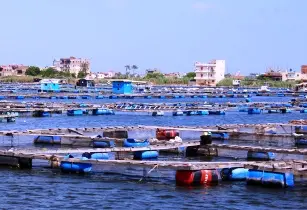Aquaculture in marine cages programme is helping the fishing sector in Afowo Community Owode, Apa Kingdom in Badagry Local Government Area
This was initiated by the Lagos State and aims to empower 200 youths and women. The cage fish culture system will drive youth and women towards positive changes.
While speaking to The Nation at the symbolic stocking of the cages in Badagry, the commissioner for agriculture, Abisola Olusanya, said each of the cages would be stocked with 1,000 juveniles of tilapia and catfish.
She added that each beneficiary would also be given 20 bags of fish feeds, medication, and a monthly stipend of US$36.63 for four months, before the fish is harvested in continuance of the resolution to help them succeed in the business. Comrade Aladeotan David, a coordinator at the National Youth Council of Nigeria, Badagry West Local Branch, is one of the beneficiaries. His message to other hopeful entrepreneurs was that tilapia aquaculture is promising. “We have been taught to understand the value chain, as well as how to operate at minimum cost,” he said, while thanking the Ministry of Agriculture for motivating him to start cage culture farming this year.
Another beneficiary, Elizabeth Ogupe, said her participation in the cage aquaculture has opened up opportunity for her to make a living and she sees it as a way for engaging youth and women in the community. “The efforts of the state government has helped to increase their understanding of managing, particularly the well-being of fish in cages,” she added.
Permanent secretary of Ministry of Agriculture, Hakeem Oduyinka Adeniji, said fisheries sector was one of the main components towards guaranteeing continuous food supply in the state. He said the state government is working to reposition the aquaculture sector for success and that they are planning to increase fish culture produce.
The goal is to spread out the production of sustainable, marine cage culture while creating employment opportunities. The objective is to empower youths and women. We have about 200 beneficiaries who were selected from the community. They were then trained by our technical team.”
Adeniji said the government was determined to promote sustainable utilisation of the rivers for food security and poverty alleviation.




